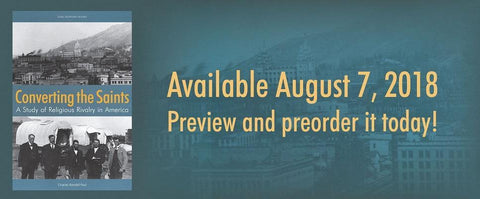Contesting Truth through Mutual Openness July 18 2018

Charles Randall Paul will be speaking on the topic of religious diplomacy and signing copies of his book at Weller Book Works (Salt Lake City) on Tuesday, Aug. 7th at 6:30 PM and at Writ & Vision (Provo) on Thursday, Aug. 9th at 7PM. Both events are free to attend.
Humans are social influencers by their very existence. They are always intentionally persuading each other in some fashion. All human life includes continual negotiation of social activities from “pass the salt” to “should we get married?” When one of us believes a purpose is good and an action right, that influences a response from others—and the response influences further responses.
While the ideal might be complete social unity or unconstrained freedom for all, human groups and societies should expect continual religious and ideological contestation. Within our interconnected societies, conflicting world-views and purposes are inevitable. No social program for peace will succeed that requires adamant believers to compromise or dilute their core values. Instead, we sustain peaceful tension within our societies through co-resistance and collaboration with our ideological rivals. Crucial to this is the absence of ill-will in our collaborative contestation.
Let me now make a distinction between these terms: Enemy, antagonist, agonist, ally, and friend. An enemy desires and acts to eliminate, enslave, or diminish others by passive or aggressive means. An antagonist acts like an enemy but does not desire to be one. If she presumes you are an enemy, she might be reacting defensively with no intent to harm you otherwise. An agonist is a fellow contestant who desires to win an ideological contest through persuasion. An ally is on your side because of shared interests. A friend desires your love and well-being and will self-sacrifice to promote it. It is possible to be an ally that is also really an enemy, but it is impossible to be a real friend and an enemy. However, your agonistic rival can also be your friend—but enduring (much less enjoying) this relationship is an acquired taste and skill.
If you have a real enemy, you need to defend yourself accordingly. But we need to determine first if antagonists are true enemies or agonists. An agonist desires to contest differences in order to bring about positive change for both sides, rather than the destruction of their rival. Sportsmanship is a common attitude of agonists. Persuading agonists to your side may make them allies; but converting agonists to trust and love can make them friends even while they remain persuasive agonists. The path forward lies in vulnerable openness between rivals with an open and honest disclosure of motives and beliefs. This requires courage to exchange critical and offensive ideas and ideals without taking offense. Let there be no mistake: openness that is truly open to change is always a dangerous experiment, especially for those who are concerned about diluting true orthodoxy (on the left or right) with relativism.
To prepare for inevitable contestations over religious, political, or ideological differences, I present ten useful attitudes and methods to remember when the pressure to either disengage or eliminate our fellow agonists becomes intense. I call this The Way of Mutual Openness:
Be Honest
Honesty begins when you look in the mirror. Who do you really think you are and who do want to become? When you are deeply honest, you acknowledge your motives for doing things and express your thoughts and feelings without faking it. Your honesty prompts others to respond the same way, and with open hearts and minds real communication results.
Be Kind
Kindness goes further toward building trust than the other practices listed here. It is not weak, naive, or mere politeness. Kindness is a language easily recognized and understood by everyone. Sincere kindness is a powerful way to influence others to desire to hear you. But, be wise: nothing shatters trust more than phony, manipulative kindness, or false respectfulness.
Listen Well
It is hard to listen well when you focus more on your feelings and thoughts than those of the person addressing you. Listening well is not remaining quiet before you insert your response; it is intense focus on a unique person with a desire for understanding. By listening like this to others you offer the gift of respectful empathy that everyone craves to receive. In return others feel like they should listen well to understand you.
Share the Floor
If you want to be taken seriously you must take others seriously. Sharing the floor means allowing others equal time to speak even when you “know” you are right and they are wrong. It acknowledges the mutual dignity of those engaged in conversation. Hogging the floor is disrespectful and rude, and it always undermines your persuasive ability when you appear dismissive or fearful of what others have to say.
Presume Good Will
We often presume that others do not have our best interests at heart. Sometimes they don’t. But you sabotage any honest communication with someone you presume to be stupid, duped, or ill-intentioned. Presuming good will is not agreeing with others’ beliefs or values. It means that you grant that others are clear thinking and good hearted unless they prove otherwise.
Acknowledge the Differences
Each human is uniquely different with a unique history and perspective. Acknowledging our important differences openly frees us to know where we stand without having to guess. It creates a tone of trust for real conversation. You cannot feel whole or honest if you focus only on similarities and avoid facing differences in deep beliefs and values.
Answer the Tough Questions
With genuine differences come tough questions—especially if the goal is a trusting relationship. When you answer tough questions in a straightforward way, sharing the floor equally and presuming good will, you build strong mutual trust. You can then face offensive issues without taking offense. However, diving deeper for better understanding has a limit. Aggressive interrogation or pushing for private details destroys trust.
Give Credit Where Credit is Due
Any compliment feels good, but a sincere compliment from an unexpected source such as a rival or critic can move our hearts powerfully toward trust. By openly admiring the excellence or good on “the other side” you demonstrate your honesty and fairness, and your confidence that your side can handle the truth. But be cautious—insincere compliments to manipulate or disarm others disastrously undermine any grounds for trust.
Speak Only for Yourself
Each of us is unique and we don’t like others—especially outsiders—to stereotype us or claim they know what we really believe or value. So, ask rather than tell others what they think and feel. It is tempting to speak for your friends and tribe members as if they all share the same view as you do. Except when you have been authorized to speak on behalf of others, speak only for yourself and encourage others to do likewise.
Keep Private Things Private
Humans are social beings, but their thoughts and feelings are private unless expressed. Personal dignity is based in large part on your freedom to choose when and where to share your inner self with others. Being open, honest, and trustworthy does not require you to disclose all things to all people. Keeping private things private means that you strictly honor someone’s choice to say something to you alone. If you cannot keep it private, you should ask the person not to share it.
These are the times that try our souls. In our increasingly polarized society, we will doubtless continue arguing over political, ideological, and religious differences. Based on years of experience in religious diplomacy, I believe the ten attitudes above will sustain with confidence anyone using them to actively engage in challenging and rewarding conversations that build healthy trust.
 Charles Randall Paul is board chair, founder, and president of the Foundation for Religious Diplomacy. He has lectured widely and written numerous articles on healthy methods for engaging differences in religions and ideologies. He is the author of Converting the Saints: A Study of Religious Rivalry in America.
Charles Randall Paul is board chair, founder, and president of the Foundation for Religious Diplomacy. He has lectured widely and written numerous articles on healthy methods for engaging differences in religions and ideologies. He is the author of Converting the Saints: A Study of Religious Rivalry in America.

